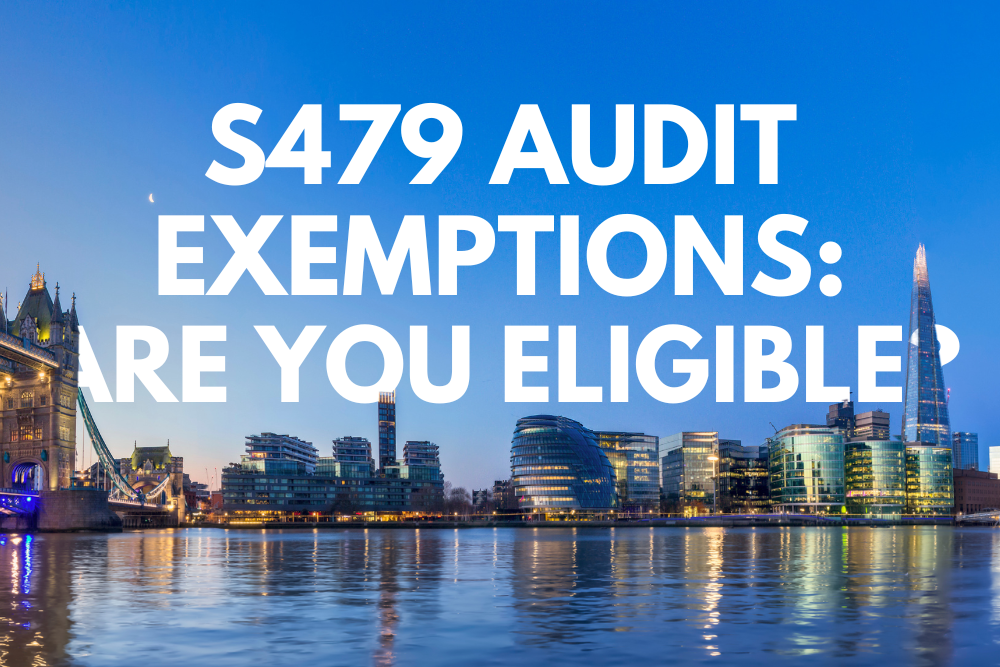
S479 Audit Exemptions: What You Need to Know
Wondering if your subsidiary company is exempt from statutory audits? We can help you determine if you are eligible for an exemption from audit by way of parent guarantee under Section 479, Companies Act 2006 (CA06).
Which entities can use the exemption?
The audit exemption by parent guarantee (s479) can be used by a trading subsidiary whose parent undertaking is established under UK law. There is no limit on the size of the company for the purposes of this exemption, however a subsidiary within a small group (or a dormant subsidiary within a group of any size) may be eligible for exemption under other provisions, without the need for a parent guarantee, which would be easier to utilise. Section 382, meanwhile, lays out what constitutes a ‘small’ group.
Some companies are excluded under s479B of the Act. These include traded companies and authorised insurance and banking companies. These exclusions refer to the status of the subsidiary company that is looking to use the exemption, irrespective of the parent company.
What are the conditions?
To be exempt from audit by parent guarantee, the subsidiary must meet the conditions set out in s479A. These include the parent undertaking having been established under the law of any part of the United Kingdom.
The subsidiary company applying the exemption must be included in the relevant parent company consolidated accounts, in accordance with the specified applicable accounting standards. The parent company must also disclose in the notes to the consolidated accounts that the subsidiary is exempt from audit. Furthermore, the directors of the company should deliver to the registrar (on or before the date that they file the accounts for that year) the documents set out in the Act as per below:
- A written notice of agreement
- Audit exemption statement of guarantee by the parent company – AA06 form
- Consolidated parent accounts with the Auditor’s Report on those accounts.
What documentation is required and how is the guarantee given?
To be eligible to apply for audit exemption, several documents as summarised above need to be completed, signed and filed at Companies House.
All members of the subsidiary company must first demonstrate their agreement to the exemption by signing a members’ agreement. This will then be filed at Companies House.
The parent must then issue a statutory guarantee of the subsidiary’s outstanding liabilities. This is achieved following completion of a form (AA06), which is also filed at Companies House for the subsidiary.
Lastly, the subsidiary company must be included in the consolidated accounts drawn up by the parent undertaking. The parent undertaking must then ensure it discloses in the consolidated accounts that the subsidiary company is exempt by virtue of s479A.
Arnold Hill & Co’s Audit RI, Dipesh Giri – member of the ICAEW – urges anyone who has any questions about audit exemption to get in touch. He says: “s479 exemption has been in place since October 2012 and previously applied to all subsidiaries with parent undertaking under the law of an EEA, which has changed since Brexit to be only applicable for UK companies. This is one of the exemptions available that does not appear to have been utilised to its fullest extent. There could be substantial cost benefit as well as reducing the administrative burdens to the group by eliminating the need to carry out audits for every single entity in the group if the exemption is appropriate.”
Do you have any questions about s479 audit exemptions? If so, do not hesitate to contact our friendly team here at Arnold Hill & Co.
Author, Dipesh Giri - Audit RI
.jpg?width=129&height=129&name=Dipesh-Giri%20(1).jpg)
